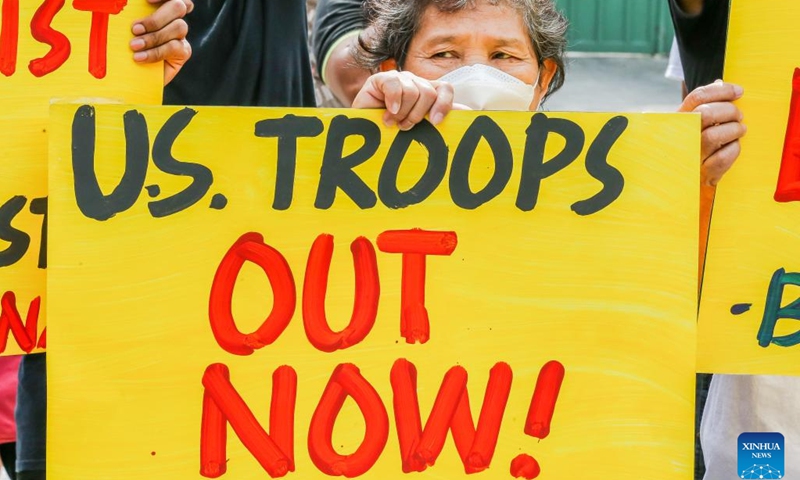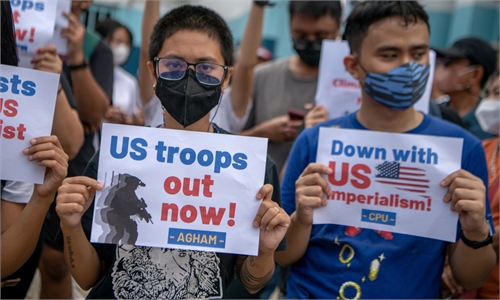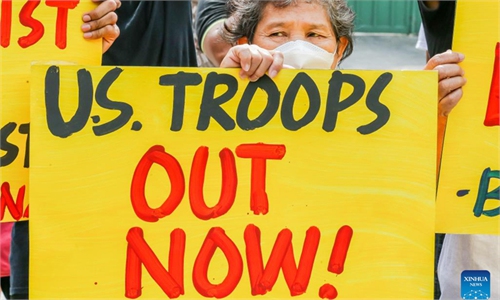Philippines warned of being dragged into Taiwan Straits situation by domineering US

People hold placards during a protest rally against the U.S.-Philippines Balikatan joint military exercises in front of the gate of the Armed Forces of the Philippines (AFP) headquarters in Quezon City, the Philippines, April 11, 2023. More than 17,000 Philippine and U.S. troops on Tuesday kicked off the most extensive joint military activities in decades in the Philippines amid criticisms that it escalates tension in the region rather than peace and stability.(Photo: Xinhua)
The Philippines is trying to strike a balance between China and the US and ease concerns of regional countries over the US' increased military presence in the South China Sea, but given the unequal relationship between the Philippines and the US, there is a high risk that the Philippines will be able to do nothing when the US wants to break its word and drag the country into the Taiwan question, observers warned, after Philippine President Ferdinand Marcos denied that US access to more military bases in the country was intended for "offensive action" against any country.
Marcos made the remarks at the Center for Strategic and International Studies in Washington on Thursday local time, Reuters reported.
Marcos defended the move at the think-tank, saying that the 2014 Enhanced Defense Cooperation Agreement (EDCA) that allows US access to bases in the Philippines was to deal with climate change. He said the US had never brought up the possibility that those bases would be used for offensive action against any country.
The Philippines has allowed US military forces access to four additional bases in the Southeast Asian nation, bringing the total number to nine, with several bases close to China's island of Taiwan. The Philippines' defense chief Carlito Galvez had called the sites "very strategic."
Marcos' clarification of the Philippines' allowing the US use of its military bases is a "disguised replacement of concept." A military base is a military base and its nature will not change no matter how hard you try to whitewash it, Song Zhongping, a Chinese military expert and TV commentator, told the Global Times on Friday.
A military base naturally takes "offensive action," not to mention its other important roles of detecting, listening in, and spying on other countries. Once the military bases fall into US hands, the US can effectively detect activities in the Taiwan Straits, the Nansha Islands and even Huangyan Island in an all-round way. Isn't this a threat to China's national security? Song asked.
The US has laid out in very clear terms under bilateral security guidelines with the Philippines agreed on Wednesday that it will come to its defense if its armed forces, including coast guard vessels, came under attack anywhere in the South China Sea.
In response, Mao Ning, a spokesperson of China's Foreign Ministry, said on Thursday that China firmly opposes any country's move to meddle in the South China Sea issue to harm China's territorial sovereignty and maritime rights and interests.
"I would like to stress that the South China Sea is a shared home for countries in the region, not a hunting ground for forces outside the region. When regional countries are committed to mutual trust, solidarity, cooperation and properly handling differences, they have in their hand the key to peace and stability in the South China Sea," Mao said.
Chen Xiangmiao, director of the world navy research center at the National Institute for South China Sea Studies, deemed that Marcos is trying to express sincerity to maintain his country's relationship and cooperation with China and ease the concerns of other regional countries over the military bases.
But will the Philippines be able to stop the US when it breaks its word and uses these military bases to interfere in the Taiwan question? The answer is apparently "No", given the unequal relationship and capability between the US and the Philippines as well as the US' domineering behavior, according to Chen.
Marcos met with US President Joe Biden on Monday, making him the first Philippine leader to visit the White House in 10 years. The meeting came after the two countries' "largest ever" military drills from April 11 to 28. A "2+2" meeting of the defense and foreign ministers from the two sides was also held on April 11 amid their live-fire drills in waters in the South China Sea.
Amid the intensive interaction with the US, the Philippines also invited Chinese State Councilor and Foreign Minister Qin Gang to visit the country. During a meeting between Marcos and Qin on April 22, Marcos confirmed that the Taiwan question is China's internal affair,?and the Philippines will continue to strictly abide by the one-China policy as it has always done.
These actions indicate that the Philippines wants to seek a balance between trade cooperation with China and security support from the US, but this is only wishful thinking.
What the Philippines said and has actually done contradict each other, making the country very "split" in handling China and US-related affairs. The Philippines cannot please both sides as this harms China's interests, Chen told the Global Times.




